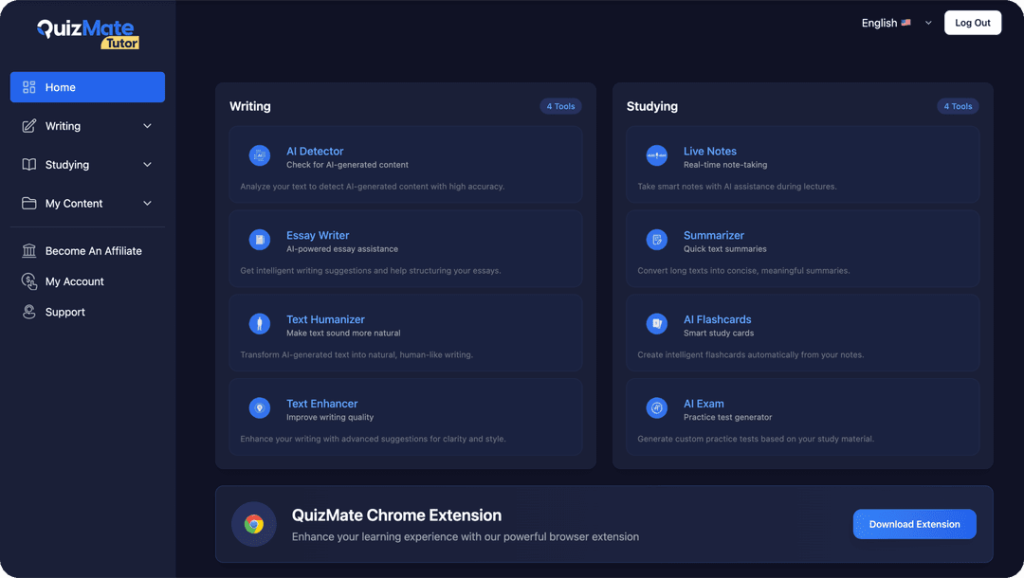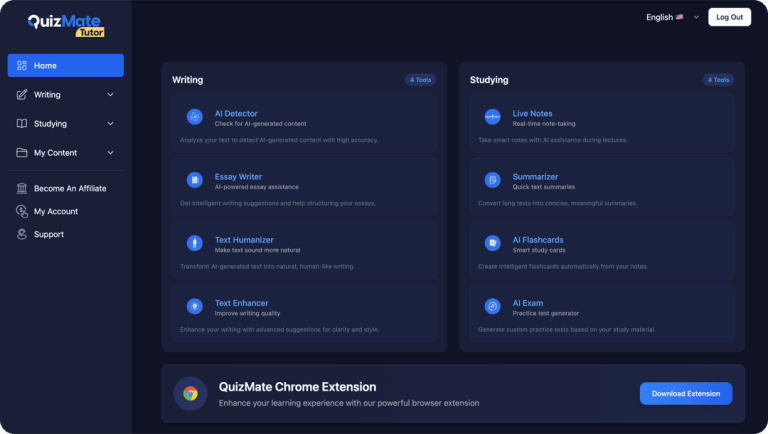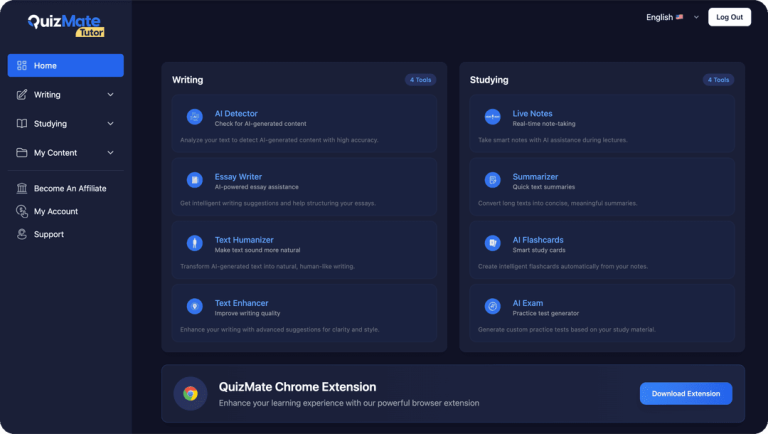Is QuizMate Detectable? Lets find the Truth

In the fast-paced world of online exams and tests, many students and professionals seek ways to maximize their performance, sometimes using tools like QuizMate. This tool has gained significant attention for its ability to assist with quizzes, learning, and exam strategies. However, the big question on everyone’s mind is: Is QuizMate detectable? This article delves into the details of QuizMate, exploring its functionality, detection methods, and the risks involved. By the end, you’ll be able to make an informed decision about whether using QuizMate is worth the risk.
What is QuizMate?
QuizMate is a browser extension designed to assist users in online quizzes and exams. It’s aimed at helping students, test-takers, and professionals by offering various tools that simplify quiz-taking. Users of QuizMate can benefit from its unique features that provide real-time answers, hints, and other tools to improve test performance. It’s popular for its ability to help students perform well on exams, whether they are for academic purposes or professional certifications.
Usage of QuizMate
QuizMate is primarily used by:
- Students: QuizMate is most commonly used by students preparing for exams, especially those who feel pressured to perform well. It’s designed to help with exam strategies and maximize performance.
- Test-takers: Individuals taking certification tests or any other professional exams may use QuizMate to ease their testing experience.
- Professionals: People who have to complete online assessments for job certifications or other qualifications may use it as a performance booster.
Detection Methods Used by Exam Systems
To maintain integrity, online exam systems are equipped with a variety of detection methods to catch cheating or unfair practices. Let’s explore some of the common detection systems that may flag QuizMate during online testing:
Anti-Cheat Software
Many online exam platforms employ anti-cheat software to monitor the integrity of the testing environment. These systems are designed to detect suspicious behavior that could suggest cheating. Anti-cheat software typically looks for unauthorized tools, such as QuizMate, being used during a test.
Methods of Detection
Here are the common detection methods used to identify cheating during online exams:
1. Browser Monitoring
Browser monitoring is one of the most commonly used techniques in online exam environments. It tracks the activity within the browser during the test, identifying actions like opening new tabs, using search engines, or accessing unauthorized resources like QuizMate. If QuizMate is open in a browser tab or being used in any way during an exam, the system can flag it for review.
2. Proctoring Software
Proctoring software provides remote monitoring of the exam environment. It can include both human proctors and AI-driven surveillance tools. Proctoring systems track the behavior of test-takers through cameras and microphones, looking for any signs of cheating or the use of external aids. If QuizMate is in use and the proctoring system detects irregularities such as unauthorized sounds or movements, the test-taker could be flagged.
3. Screen Recording
Another common detection method is screen recording. Some exam platforms record the test-taker’s screen activity to ensure no cheating tools are being used. If a user switches to an application like QuizMate during the exam, it will likely be recorded and flagged during a post-exam review.
4. AI-based Detection
AI-powered detection is increasingly common in modern online exam systems. These systems use machine learning algorithms to detect patterns of behavior that are indicative of cheating. For example, if the AI detects rapid searches or unusual clicking patterns while an exam is in progress, it may raise a flag that the user is relying on a tool like QuizMate.
Is QuizMate Detectable?
The central question remains: Is QuizMate detectable? In short, the answer depends on several factors, including the exam platform’s security features, the user’s behavior during the exam, and the testing environment. QuizMate itself doesn’t have a built-in mechanism to hide its usage from detection software, meaning that if detected, it could result in penalties or disqualification from the exam.
Detection Mechanisms in QuizMate
QuizMate functions by providing users with answers and hints during online exams. It works by processing questions in real-time, which means it has the potential to be caught by the monitoring systems mentioned above. Its lack of concealment features makes it detectable if any of the mentioned detection methods are in use. However, some users may attempt to bypass detection through various methods, which could impact the reliability and safety of their use.
Factors Affecting Detection
While QuizMate itself might not be inherently detectable, several factors can influence whether it will be flagged:
1. Software Updates
QuizMate undergoes regular updates to improve its performance and security. These updates can either enhance or diminish its ability to avoid detection. If the software is updated frequently, it may stay one step ahead of detection methods, making it harder for exam platforms to flag it. However, an outdated version could be easier to detect.
2. User Behavior
The behavior of the user during the exam also plays a significant role. If a user is too obvious in their actions—like switching tabs frequently, searching for answers too quickly, or showing erratic typing patterns—the chances of detection increase. Properly using QuizMate in a subtle manner can minimize the risk of being flagged.
3. Testing Environments
The environment in which the exam is taken also affects detection rates. For example, a home environment may lack proctors or robust monitoring systems, making detection less likely. However, exams taken in controlled environments with higher security and more monitoring will likely have a much higher chance of identifying tools like QuizMate.
Case Studies and Real-Life Examples
To truly understand whether QuizMate is detectable and the risks involved, let’s take a look at some real-life examples and expert opinions. These case studies offer insight into how QuizMate has been used, both successfully and unsuccessfully, in online exams.
Success Stories
While many users are concerned about the potential for detection, some have successfully used QuizMate without facing any issues. These success stories often involve exams that are less monitored or when users take extra precautions to ensure their actions do not raise red flags. For instance, students preparing for online quizzes in relaxed testing environments report fewer issues with detection. Users who operate QuizMate discreetly, minimizing suspicious activities such as excessive tab switching or rapid typing, tend to have a much higher success rate without being caught.
Detected Cases
On the other hand, there are also documented cases where QuizMate has been detected. This usually happens when the exam system uses advanced AI detection methods or has strict proctoring measures in place. For example, a recent case involved a user who attempted to use QuizMate during a high-stakes professional certification exam. Despite being cautious, the user’s activity was flagged when the system’s AI noticed unusual behavior patterns such as rapidly changing the focus of their screen. As a result, the user’s exam results were invalidated, and they were banned from retaking the test.
Expert Opinions
Experts in online exam security generally agree that tools like QuizMate present a real risk to test integrity. According to Dr. James Marlow, a professor in Educational Technology, “While tools like QuizMate may help students perform better, they undermine the fairness of online assessments. It’s only a matter of time before detection systems catch up.” Many exam security specialists warn that relying on such tools can result in severe consequences, including academic misconduct charges or professional disqualifications.
How to Avoid Detection
If you still choose to use QuizMate despite the risks, there are ways to reduce the likelihood of detection. These best practices can help you operate more discreetly during online exams.
Best Practices
- Minimize Switching Tabs: One of the most common ways to get caught using QuizMate is by frequently switching tabs or windows. This behavior is easily detected by browser monitoring systems. Keep the focus on the exam window and minimize any unnecessary actions.
- Use Keyboard Shortcuts: Instead of clicking around the screen, use keyboard shortcuts to navigate between different areas of the exam or tool. This can make your actions appear more natural.
- Practice Timing: Try to work at a consistent pace that doesn’t stand out. Sudden bursts of fast activity or pauses can attract attention.
- Adjust the Screen Resolution: Some users have reported success with adjusting the screen resolution to prevent proctoring software from clearly identifying open applications. This may not guarantee safety but can make it harder for surveillance software to spot your usage of QuizMate.
Alternative Methods
If you’re looking for alternatives to QuizMate that are less likely to be detected, consider using other study tools and resources that are allowed by the exam platform. Some educational platforms offer legitimate ways to prepare for exams, such as practice tests, study guides, and approved calculators or notes. While these methods may not provide the same instant access to answers, they are far safer in terms of avoiding detection.
Ethical Considerations
While it might be tempting to use QuizMate or similar tools to improve your exam performance, it’s essential to consider the ethical implications of doing so. Using cheating tools violates the principles of academic integrity and can undermine the fairness of the exam process.
Integrity of Exams
Academic institutions and certification bodies rely on fair assessments to evaluate students’ knowledge and abilities. Using tools like QuizMate for dishonest advantage compromises the integrity of the testing system and potentially devalues the qualifications obtained through it.
Consequences of Cheating
The consequences of being caught using cheating tools like QuizMate can be severe. For students, it could result in academic penalties, including failing the exam, expulsion, or even revocation of degrees. For professionals, using such tools during certification exams can lead to invalidation of exam results, disqualification from future tests, and damage to their professional reputation.
Conclusion
After examining the details of QuizMate and its detectability, it’s clear that while it can be an effective tool for assisting with quizzes and exams, its use comes with significant risks. Detection methods, such as browser monitoring, proctoring software, and AI-based systems, are becoming increasingly sophisticated, making it more difficult to use tools like QuizMate without being caught.
While some users may get away with using QuizMate in low-stakes or less-monitored exams, others face serious consequences in high-security testing environments. Ultimately, the best approach is to prioritize studying and preparation rather than relying on tools that might put your academic or professional future at risk. Make an informed decision about whether or not to use QuizMate based on your personal circumstances and the potential consequences.
FAQs
Is QuizMate safe to use in exams?
While QuizMate can be a useful tool for studying and enhancing quiz performance, it carries risks if used during actual exams. Many exam systems are designed to detect cheating tools, and using QuizMate could result in your test being flagged for suspicious behavior. It’s always safer to use legitimate resources and study techniques to prepare for your exams.
Can I get caught if I use QuizMate?
Yes, it’s possible to get caught using QuizMate, especially if you’re taking an exam on a platform with strong anti-cheat measures. Detection methods like browser monitoring, proctoring software, and AI-based analysis can easily identify when a tool like QuizMate is in use. If caught, the consequences can range from invalidating your exam results to more severe academic or professional penalties.
What are the alternatives to QuizMate?
If you’re looking for safer alternatives to QuizMate, there are plenty of legitimate study aids and resources available. Many online learning platforms offer practice exams, flashcards, and other study tools that can help you prepare without compromising exam integrity. Consider using tools like Quizlet, Khan Academy, or even official practice exams provided by exam boards.
Are there any legal repercussions for using QuizMate in exams?
Yes, using tools like QuizMate to cheat on an exam could lead to legal consequences, especially in professional or accredited exams. Many exam platforms include clauses in their terms of service that outline penalties for cheating, including invalidation of results and possible legal actions for fraud.
Final Thoughts
In conclusion, QuizMate is a powerful tool for studying and improving quiz performance. However, its use during actual exams comes with significant risks. The detection methods used by modern exam systems make it increasingly difficult to use such tools without being caught. Furthermore, using QuizMate in a way that violates exam integrity can have serious academic and professional consequences. As always, the best strategy for success in exams is honest preparation and relying on authorized resources.
View More: Is Quizmate Legit? Everything You Need to Know
Quizmate Browser Extension Tool Guide
What is Quizmate.io and How it Works?
Quizmate.io Extension How to Use
Author Credentials
Mehrab Nabil is a seasoned content writer and SEO expert with years of experience in digital marketing and educational technology. With a deep understanding of the importance of interactive learning tools, Mehrab has written extensively on various topics related to online education, productivity tools, and AI-based solutions. His work focuses on providing insightful and valuable content to help educators, students, and businesses improve their learning and engagement experiences. In addition to his expertise in educational technology, Mehrab also reviews Amazon products, offering comprehensive and unbiased insights to help consumers make informed purchasing decisions. As a professional writer, Mehrab combines his passion for technology with a commitment to delivering high-quality, informative articles that are both engaging and SEO-optimized.
Affiliate Disclaimer: This post contains affiliate links. If you use these links to buy something, we may earn a commission at no additional cost to you. Thank you for supporting our blog!

